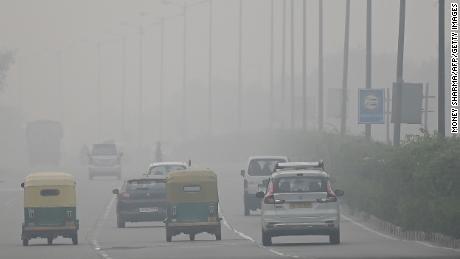A silent killer is choking India’s capital. For millions, there’s no choice but to breathe it in

Like millions of Indians who survive on handouts or daily wages, the 84-year-old says he has no choice but to be outside, breathing air thick with smog in the Indian capital.”I come here and wait. Sometimes, people give me food,” said Singh, his voice straining over the noise of auto rickshaws and cars belching fumes just meters away.Delhi is often ranked among the world’s most polluted cities, and air pollution there reached “hazardous” levels in early November, according to India’s National Air Quality Index (AQI), which tracks the presence of harmful particles in the air.But some Delhi residents have become so accustomed to bad air that it’s a part of daily life — they barely notice it, they say.Others say it’s making them sick.The ‘silent killer’Delhi is not the only Indian city choked by smog.Last year, nine of the world’s 10 most polluted cities were in India, according to monitoring network IQAir.According to the World Health Organization (WHO), air pollution causes an estimated 7 million premature deaths a year globally, mainly as a result of increased mortality from cardiovascular diseases, cancers and respiratory infections.Bad air could be reducing the life expectancy of hundreds of millions of Indians by as much as nine years, according to a recent study by the Energy Policy Institute at the University of Chicago (EPIC).The study also found that every single one of India’s 1.3 billion residents endure annual average pollution levels that exceed guidelines set by WHO.In 2019, the central government announced a national clean air campaign, with an aim to reduce particulate pollution by up to 30% by 2024. Specific plans were created for each city; in Delhi, those plans included measures to reduce road traffic, burn-offs and road dust, and to encourage the use of cleaner fuels.But in the past few years, India’s pollution problem has worsened, partly due to the country’s dependency on fossil fuels — and in particular, coal.At the recent COP26 climate summit in Glasgow, India was among a group of countries that pushed for an 11th-hour amendment to the agreement to phase “down” coal rather than phase it “out”.In Delhi, noxious air is claiming tens of thousands of lives each year, according to analysis of IQAir data by Greenpeace.But despite the worsening air quality, some Delhi locals have become so accustomed to it they don’t seem to notice.Many roam the streets without a face mask and have developed a general complacency toward pollution levels.Omprakash Mali, a 50-year-old gardener, say the air pollution doesn’t affect him or his work.”We work with mud and in dust as a gardener, so I don’t feel anything additional,” he said. “I think the top priority for the government should still be Covid-19. Pollution happens every year.”Meanwhile, Shesh Babu, 18, a manual laborer, said he “doesn’t really care” about Delhi’s thick smog. His priority is earning money.Dubey, the activist, says air pollution is considered to be an “elitist” issue.”Air pollution is a silent killer,” he said. “There is a lack of awareness. People don’t realize the seriousness of it.”






